|
|
|
Sort Order |
|
|
|
Items / Page
|
|
|
|
|
|
|
| Srl | Item |
| 1 |
ID:
116436
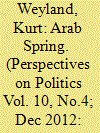

|
|
|
|
|
| Publication |
2012.
|
| Summary/Abstract |
Prominent scholars have highlighted important similarities between the Arab Spring of 2011 and the "revolutions" of 1848: Both waves of contention swept with dramatic speed across whole regions, but ended up yielding rather limited advances toward political liberalism and democracy. I seek to uncover the causal mechanisms that help account for these striking parallels. Drawing on my recent analysis of 1848, I argue that contention spread so quickly because many people in a wide range of countries drew rash inferences from the downfall of Tunisia's dictator. Applying cognitive heuristics that psychologists have documented, they overrated the significance of the Tunisian success, overestimated the similarities with the political situation in their own country, and jumped to the conclusion that they could successfully challenge their own autocrats. This precipitation prompted protests in many settings that actually were much less propitious; therefore problems abounded. Cognitive shortcuts held such sway because Arab societies were weakly organized and repressed and thus lacked leaders from whom common people could take authoritative cues. The decision whether to engage in emulative contention fell to ordinary citizens, who-due to limited information access and scarce experience-were especially susceptible to the simple inferences suggested by cognitive heuristics.
|
|
|
|
|
|
|
|
|
|
|
|
|
|
|
|
| 2 |
ID:
101003
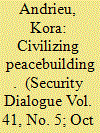

|
|
|
|
|
| Publication |
2010.
|
| Summary/Abstract |
In spite of recurrent calls for a more locally rooted approach to the building of 'local capacities', peace operations today are still largely under the influence of US hegemony and neoliberal values. Their aim is to transform war-torn societies along liberal lines, in both the political and the economic spheres. To achieve this, it is argued that the international community must begin by acting illiberally: rebuilding the structures of the state in order to give it the capacity to monopolize legitimate violence and manage the societal conflicts that are the unfortunate by-products of democracy and the free market. Leaders and 'high politics' are the central targets, as it is hoped that the rest of society will be affected in turn. However, this kind of social engineering from the top down can be counterproductive for the peace process and the nature of transition. Civil society should not be a secondary target: it should be the primary one. The Weberian approach to peace operations focuses too much on objective sources of legitimacy at the expense of those rooted in local, subjective perceptions of society. Since transitional justice has recently become part of the liberal peacebuilding 'package', integrated into a broad, positive definition of peace itself, transitional justice too should focus on civil society first. Building upon Habermas's notion of communicative action and Putnam's definition of social capital, this article will formulate the basis of a new approach to peace operations, one that would aim less at the rebuilding of state institutions and more at the reconstruction of social relations and unfettered dialogue between communities.
|
|
|
|
|
|
|
|
|
|
|
|
|
|
|
|
| 3 |
ID:
047100


|
|
|
|
|
| Publication |
Oxford, Clarendon Press, 2000.
|
| Description |
xxviii, 799p.Hbk
|
| Contents |
Vol. I.: The build-up of German Aggression.
|
| Standard Number |
019822866X
|
|
|
|
|
|
|
|
|
|
|
|
Copies: C:1/I:0,R:0,Q:0
Circulation
| Accession# | Call# | Current Location | Status | Policy | Location |
| 044365 | 940.540943/DEI 044365 | Main | On Shelf | General | |
|
|
|
|
| 4 |
ID:
075220


|
|
|
|
|
| Publication |
2006.
|
| Summary/Abstract |
Political scientists, sociologists, and economists have all sought to analyze the spread of economic and political liberalism across countries in recent decades. This article documents this diffusion of liberal policies and politics and proposes four distinct theories to explain how the prior choices of some countries and international actors affect the subsequent behavior of others: coercion, competition, learning, and emulation. These theories are explored empirically in the symposium articles that follow. The goal of the symposium is to bring quite different and often isolated schools of thought into contact and communication with one another, and to define common metrics by which we can judge the utility of the contending approaches to diffusion across different policy domains.
|
|
|
|
|
|
|
|
|
|
|
|
|
|
|
|
| 5 |
ID:
166099
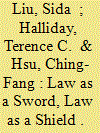

|
|
|
|
|
| Summary/Abstract |
What does the rule of law mean in the Chinese context? Based on empirical research in Beijing and Hong Kong, this article examines the various ways politically liberal lawyers in China make sense of the rule of law in their discourses and collective action. Although the rule of law is frequently invoked by lawyers as a legitimating discourse against the authoritarian state, its use in practice is primarily for instrumental purposes, as both a sword and a shield. For activist lawyers in Beijing, the pursuit of judicial independence is nothing but a distant dream involving a restructuring of the state, and they therefore focus their mobilisation for rule of law around basic legal freedoms and the growth of civil society. By contrast, Hong Kong lawyers hold the autonomy of their judiciary as a paramount value mainly because it is a powerful defensive weapon against Beijing’s political influence. The rule of law as a shield is only effective where its institutional and normative foundations are solid (as in Hong Kong), and it becomes little more than a blunt sword for lawyers where such foundations are weak or missing (as in mainland China).
|
|
|
|
|
|
|
|
|
|
|
|
|
|
|
|
| 6 |
ID:
128274
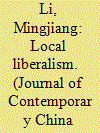

|
|
|
|
|
| Publication |
2014.
|
| Summary/Abstract |
One of the most interesting phenomena in contemporary international relations is the growing role of local government entities in forging and intensifying cross-border interactions in the social, economic and cultural arenas. Lamentably, this aspect of international relations, which I conceptualize as local liberalism, has not received sufficient scholarly attention. This paper attempts to fill in the gap by describing and analyzing how local liberalism has played a role in China's relations with Southeast Asia. The paper argues that local governments in Yunnan and Guangxi have played an important and positive role in cementing the relations between China and Southeast Asia. The paper suggests that debunking the China 'black box' to examine the different units in China, including the sub-national governments, may provide more useful insights for our understanding of China-Southeast Asian relations.
|
|
|
|
|
|
|
|
|
|
|
|
|
|
|
|
| 7 |
ID:
108526
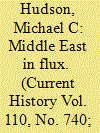

|
|
|
| 8 |
ID:
160640
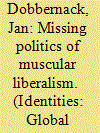

|
|
|
|
|
| Summary/Abstract |
The article examines the idea of muscular liberalism, first invoked by David Cameron as a paradigm of assertive policymaking in opposition to ‘state multiculturalism’. The rhetoric of muscular liberalism is present across western Europe, but its political effects have not been convincingly explored. In scholarship on ethnic minority integration, a ‘stimulus–response model’ credits Muslim intransigence as the trigger for the muscular stance. Other commentators put muscular liberalism into a genealogical perspective but do little to consider the circumstances of its political deployment. Working towards an alternative account, the article examines two instances of muscular liberalism in Britain: the campaign against ‘Sharia Courts’ and the ‘Trojan Horse’ affair. Different from the concern with historical continuity or stable potentials of liberal normativity, it draws attention to political operations and strategic calculations that characterize the deployment of muscular liberalism in British politics.
|
|
|
|
|
|
|
|
|
|
|
|
|
|
|
|
| 9 |
ID:
072719


|
|
|
|
|
| Publication |
2006.
|
| Summary/Abstract |
This article takes recent theoretical essays by Shanghai scholar and public intellectual, Xu Jilin, and other scholars of the history of thought and culture (sixiang wenhua shi) as a case study of efforts by intellectuals in the People's Republic of China to define and promote a role as public intellectuals separate from the party-state. This analysis suggests that political liberalism is used in such intellectual discourse to explain the social experience of intellectuals in China today and to promote a renewed public role for them. This public intellectual discourse is characterized by the continued privileging of sixiang (thought), by the naturalizing of foreign theories about liberalism, and by the use of such thought work to argue for a renewed public role for intellectuals as interpreters of public issues rather than as legislators of public values.
|
|
|
|
|
|
|
|
|
|
|
|
|
|
|
|
|
|
|
|
|